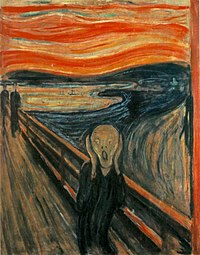
Photo from wikipedia
agnoses that required psychopharmacological intervention. The author has previously published on the prevalence, phenomenology, and psychopharmacological treatment ofOCD in referred preschool-aged children. Following initial interview, he was given multiple diagnoses… Click to show full abstract
agnoses that required psychopharmacological intervention. The author has previously published on the prevalence, phenomenology, and psychopharmacological treatment ofOCD in referred preschool-aged children. Following initial interview, he was given multiple diagnoses of ADHD, ODD, OCD, chronicmotor tic, speech sound, and anxiety disorders. Hewas administered escitalopramrisperidone combination for OCD, anxiety (insect phobia), ADHD/ODD-related problems, and tics. Escitalopram and risperidone were reported as effective and generally well tolerated in preschool-aged children with OCD and anxiety and disruptive behavior disorders, respectively.After3weeks of this combination treatment, despite significant improvement in his OCD and anxiety related problems, he developed the aforementioned distinct episode with significant behavioral, emotional, and cognitive features, all of which were considered as a manic reaction that emerged after increasing the dosage of escitalopram to 2 mg/d. An important issue in this case is to differentiate whether this constellation of symptoms was selective serotonin reuptake inhibitor (SSRI)–related behavioral activation or a manic reaction. In addition to the presence of behavioral activation symptoms, a manic reaction is differentiated from behavioral activation primarily with the presence of core manic symptoms including elevated mood, increased self esteem, and decreased need for sleep. Our case had all of these core manic symptoms in addition to symptoms of behavioral activation. Presence of comorbid ADHD and ODD could be another concern while diagnosing amanic reaction in this very young subject. However, emergence of core manic symptoms with or without worsening of premorbid ADHD/ ODD symptoms would be sufficient to diagnose a manic reaction. His family history of bipolar disorder was also considered a risk factor to develop SSRI-related mania. Upon diagnosing a manic reaction, escitalopram was discontinued, and risperidone was increased for behavioral control. One month later, manic reaction was in full remission, but he was reported as having worsening symptoms of OCD. Therefore, it was planned to switch from risperidone to aripiprazole treatment, with the rationale that aripiprazolewould be effective in treating OCD and other behavioral symptoms without causing significant adverse effects, mainly mood switches. Low dose of aripiprazole, 1 mg/d, was very effective in treating distressingOCD symptoms in this very young subject without any significant adverse effect. Despite that there are few reports on the efficacy of aripiprazole monotherapy in treatment-naive adult or young subjects and in treatment-resistant young subjects with diagnosis of OCD, to my knowledge, this is the first reported case of successful aripiprazole monotherapy in treating OCD in a preschool child. Obsessive-compulsive disorder in preschool children is highly comorbid with other psychiatric disorders, particularly with ADHD, ODD, and anxiety disorders. It is important to note that nonpsychopharmacological interventions, particularly family-based cognitive behavioral interventions, should be considered as the first-line treatment of psychiatric disorders in preschool children. However, for those who do not have access to nonpsychopharmacological interventions and/or have significant impairment, awatchful trial with psychopharmacological agents may be considered in the treatment. Together with the previous literature, this case report may prompt us to think whether aripiprazole could be a possible treatment for OCD in young or adult subjects for whom we may not use SSRIs for some reasons such as risk or presence of bipolar disorder.
Journal Title: Journal of Clinical Psychopharmacology
Year Published: 2017
Link to full text (if available)
Share on Social Media: Sign Up to like & get
recommendations!